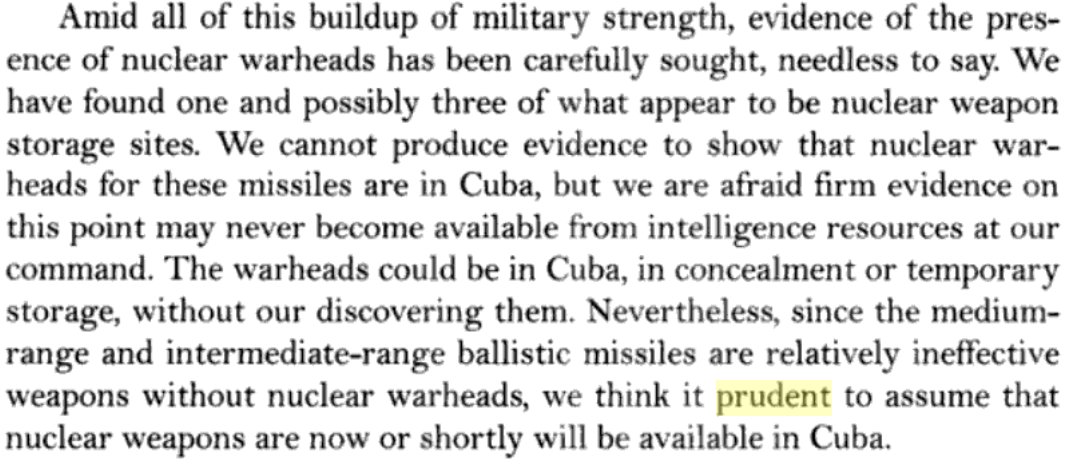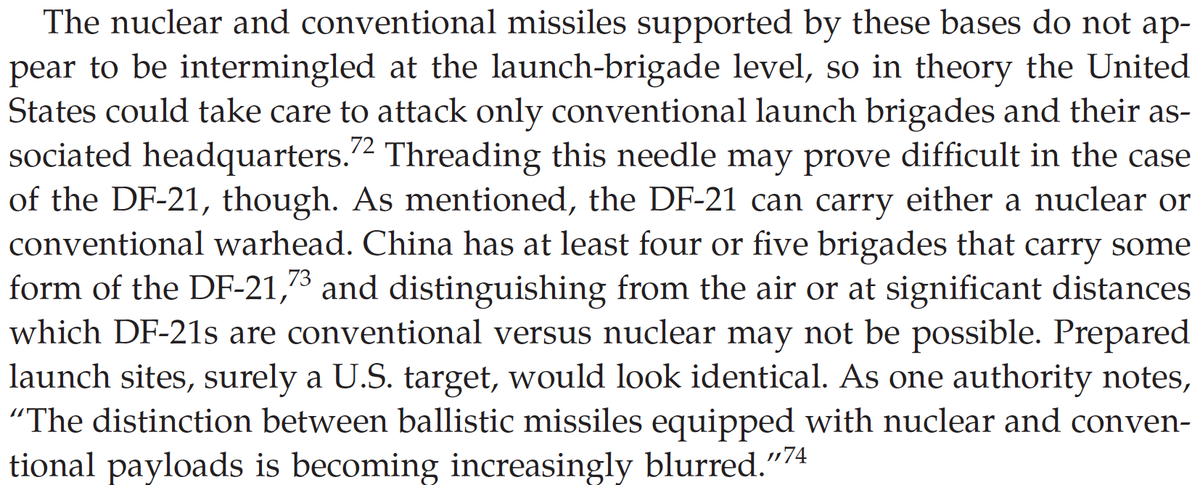<THREAD>Last week, I published my new report on the risks of pre-launch warhead ambiguity.
TL;DR? Here’s a summary in 13 tweets!
https://carnegieendowment.org/2020/04/09/is-it-nuke-pre-launch-ambiguity-and-inadvertent-escalation-pub-81446">https://carnegieendowment.org/2020/04/0... (1/13)
TL;DR? Here’s a summary in 13 tweets!
https://carnegieendowment.org/2020/04/09/is-it-nuke-pre-launch-ambiguity-and-inadvertent-escalation-pub-81446">https://carnegieendowment.org/2020/04/0... (1/13)
Warhead ambiguity is a lack of clarity about whether a weapon is nuclear or conventional.
There’s been much debate about the risks, particularly of Russia’s misidentifying a conventional weapon as nuclear *after* launch. @AndyWeberNCB @secdef19
https://www.washingtonpost.com/opinions/mr-president-kill-the-new-cruise-missile/2015/10/15/e3e2807c-6ecd-11e5-9bfe-e59f5e244f92_story.html">https://www.washingtonpost.com/opinions/... (2/13)
There’s been much debate about the risks, particularly of Russia’s misidentifying a conventional weapon as nuclear *after* launch. @AndyWeberNCB @secdef19
https://www.washingtonpost.com/opinions/mr-president-kill-the-new-cruise-missile/2015/10/15/e3e2807c-6ecd-11e5-9bfe-e59f5e244f92_story.html">https://www.washingtonpost.com/opinions/... (2/13)
By contrast, the danger of ambiguity *before* launch has been largely (but not totally) ignored.
My thesis is that, because of geopolitical and technological developments, pre-launch warhead ambiguity creates a real and growing risk of inadvertent escalation. (3/13)
My thesis is that, because of geopolitical and technological developments, pre-launch warhead ambiguity creates a real and growing risk of inadvertent escalation. (3/13)
A big reason to worry about pre-launch ambiguity is history. It’s occurred repeatedly— https://abs.twimg.com/emoji/v2/... draggable="false" alt="👏" title="Clapping hands sign" aria-label="Emoji: Clapping hands sign"> including
https://abs.twimg.com/emoji/v2/... draggable="false" alt="👏" title="Clapping hands sign" aria-label="Emoji: Clapping hands sign"> including  https://abs.twimg.com/emoji/v2/... draggable="false" alt="👏" title="Clapping hands sign" aria-label="Emoji: Clapping hands sign"> in
https://abs.twimg.com/emoji/v2/... draggable="false" alt="👏" title="Clapping hands sign" aria-label="Emoji: Clapping hands sign"> in  https://abs.twimg.com/emoji/v2/... draggable="false" alt="👏" title="Clapping hands sign" aria-label="Emoji: Clapping hands sign"> crises
https://abs.twimg.com/emoji/v2/... draggable="false" alt="👏" title="Clapping hands sign" aria-label="Emoji: Clapping hands sign"> crises  https://abs.twimg.com/emoji/v2/... draggable="false" alt="👏" title="Clapping hands sign" aria-label="Emoji: Clapping hands sign"> and
https://abs.twimg.com/emoji/v2/... draggable="false" alt="👏" title="Clapping hands sign" aria-label="Emoji: Clapping hands sign"> and  https://abs.twimg.com/emoji/v2/... draggable="false" alt="👏" title="Clapping hands sign" aria-label="Emoji: Clapping hands sign"> conflicts
https://abs.twimg.com/emoji/v2/... draggable="false" alt="👏" title="Clapping hands sign" aria-label="Emoji: Clapping hands sign"> conflicts  https://abs.twimg.com/emoji/v2/... draggable="false" alt="👏" title="Clapping hands sign" aria-label="Emoji: Clapping hands sign">—inadvertently and deliberately:
https://abs.twimg.com/emoji/v2/... draggable="false" alt="👏" title="Clapping hands sign" aria-label="Emoji: Clapping hands sign">—inadvertently and deliberately:
Berlin Crisis (1948)
Cuban Missile Crisis (1962)
Yom Kippur War (1973)
U.S.-DPRK Crisis (2017)
(4/13)
Berlin Crisis (1948)
Cuban Missile Crisis (1962)
Yom Kippur War (1973)
U.S.-DPRK Crisis (2017)
(4/13)
The information available to intelligence analysts is inevitably incomplete and imperfect. As a result, they can mischaracterize an adversary’s weapons (incorrectly assesses how they are armed) or be unable to characterize them. (5/13)
If intelligence analysts are unable to characterize an adversary’s weapons, military and political leaders may feel it “prudent” to assume that those weapons are nuclear-armed—an assumption that may or may not turn out to be correct.
https://books.google.com/books/about/The_Kennedy_Tapes.html?id=bnuvCJQnS0kC">https://books.google.com/books/abo... (6/13)
https://books.google.com/books/about/The_Kennedy_Tapes.html?id=bnuvCJQnS0kC">https://books.google.com/books/abo... (6/13)
One danger of mischaracterization is that a state might underestimate the risks of conventional military action. As @ProfTalmadge has argued in @Journal_IS, the U.S. might attack Chinese nuclear missiles that it thought were conventional.
https://www.mitpressjournals.org/doi/abs/10.1162/ISEC_a_00274?journalCode=isec">https://www.mitpressjournals.org/doi/abs/1... (7/13)
https://www.mitpressjournals.org/doi/abs/10.1162/ISEC_a_00274?journalCode=isec">https://www.mitpressjournals.org/doi/abs/1... (7/13)
I think the biggest risk associated with warhead ambiguity, though, is that it could lead one state to misread another’s *intentions*, especially regarding the use of nuclear weapons. (8/13)
If a state were considering using nuclear weapons, it might signal its intention first to try to bargain.
Nuclear signaling (which might involve dispersing nuclear-armed delivery systems) is difficult. Signals get missed. @mcfuhrmann
https://www.amazon.com/Nuclear-Weapons-Coercive-Diplomacy-Sechser/dp/1107514517">https://www.amazon.com/Nuclear-W... (9/13)
Nuclear signaling (which might involve dispersing nuclear-armed delivery systems) is difficult. Signals get missed. @mcfuhrmann
https://www.amazon.com/Nuclear-Weapons-Coercive-Diplomacy-Sechser/dp/1107514517">https://www.amazon.com/Nuclear-W... (9/13)
Warhead ambiguity could further complicate signaling. States would likely signal with dual-use weapons that were nuclear-armed. If the adversary misidentified them as nonnuclear, bargaining could fail before it had even begun and escalation could result. (10/13)
Conversely, if a state misidentified conventional weapons as nuclear, it might wrongly conclude its opponent was issuing a nuclear signal. It’s possible this could result in “inadvertent deterrence” (!) but escalation would be more likely. (11/13)
This risk isn’t hypothetical. In 1973, it looks like a technical glitch caused the U.S. to wrongly conclude that the Soviet Union was shipping nuclear warheads to Egypt, contributing to an escalation spiral involving actual nuclear alerts. (12/13) https://foreignpolicy.com/2019/11/12/the-united-states-nuclear-and-non-nuclear-weapons-are-dangerously-entangled/">https://foreignpolicy.com/2019/11/1...
I’ll write another thread later in the week, explaining what to do about this problem. For now, I want to thank the extraordinarily talented RAs who helped me:
@NDBlanchette
@GauravDKalwani
@lozovaleriia
@KaylaMatteucci
Thu-An Pham
(13/13)
@NDBlanchette
@GauravDKalwani
@lozovaleriia
@KaylaMatteucci
Thu-An Pham
(13/13)

 Read on Twitter
Read on Twitter



